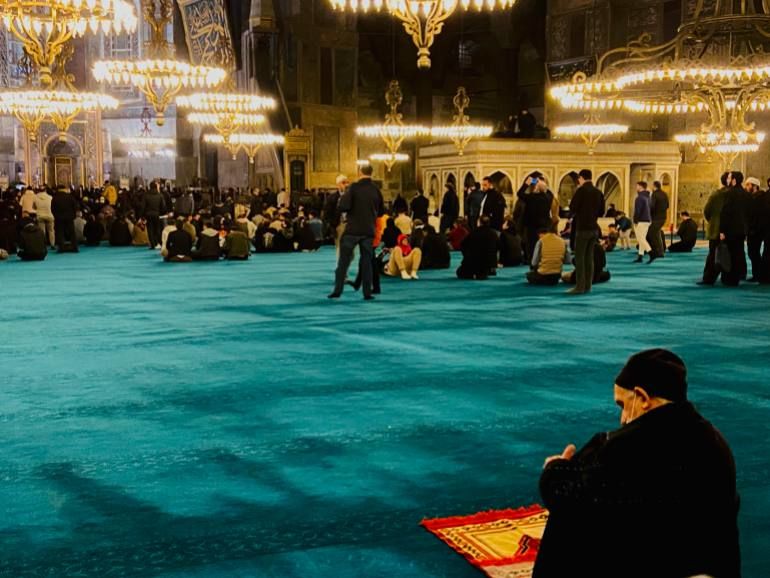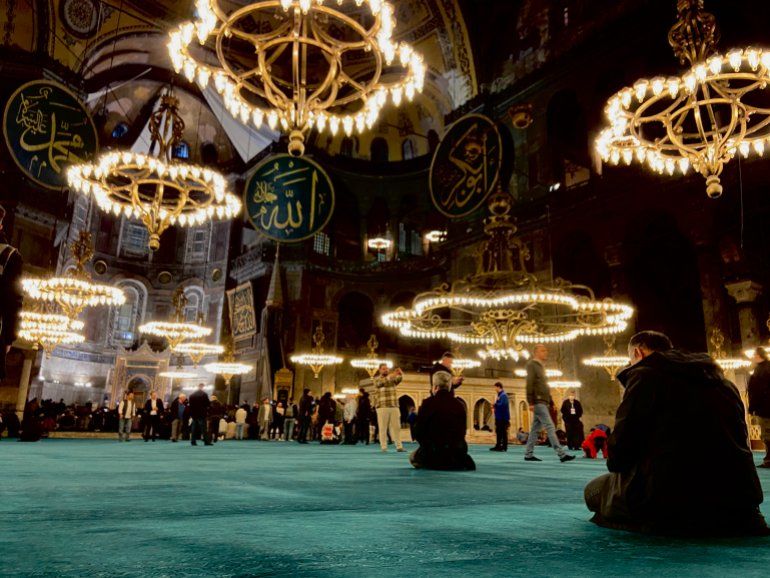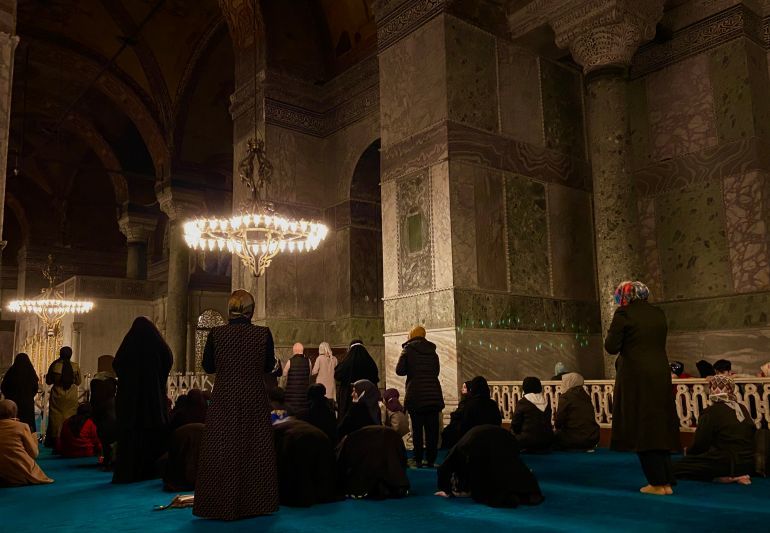
Ramadan: Hagia Sophia a glimpse of Turkey’s modern transformation
With the end of twilight covering this city, the sound of Isha prayer breathes heavily around the complex of Hagia Sophia.
As Muslims and non-Muslims – some tourists, some not – manoeuvre their way towards the antique wonder, many wait to pray and also experience the special tarawih prayers resuming in the museum-turned-mosque after 88 years this Ramadan.
Ibrahim Cetin, 50, is visiting the Grand Mosque of Hagia Sophia for the first time and remains overwhelmed with emotions.
“Despite living in this city for the past 30 years, I’m stepping into this building for the first time because I want to pray tarawih here,” he told Al Jazeera.
“I’m extremely happy that it is a mosque again. It is hard to say it in words to describe what this moment means for me,” he added as he broke down in tears.
Hagia Sophia throughout time stood as a central emblem of historic battles and shifts: the monument has been coveted and mourned by emperors, sultans, and modern-day politicians.
It has been a cathedral, a mosque, a museum, and now a mosque again after Turkey’s President Recep Tayyip Erdoğan announced the decision in 2020. The first prayer was then held under the building’s sky-high dome on July 24 that year.
Erdogan’s move received a lot of backlash and was deemed to be “politically motivated” by critics. Nuh Atikoglu, 52, a visitor to Hagia Sophia echoed similar views.
“It doesn’t matter to me if it is a mosque or a museum. I’m indifferent since there is the Blue Mosque close by as well. Erdogan took this decision to distract Turkish citizens from the ongoing political crisis at that time,” Atikoglu said.
The conversion, however, was also considered to be a longstanding demand of Turkish conservatives. Cetin had “never expected that Hagia Sophia will be a mosque again, but it is a monument belonging to our Ottoman forefathers”, he said.
 Hagia Sophia throughout time stood as a central emblem of historic battles and shifts
Hagia Sophia throughout time stood as a central emblem of historic battles and shifts
Changing meaning with history
In the first 900 years of its existence, Hagia Sophia was central to Byzantine culture and politics. Considered an architectural marvel, it was built as a basilica for the Greek Orthodox Christian Church in 537 CE during the reign of Emperor Justinian I.
Therefore, although it stands still in its form and structure, its meaning remains fluid, reflecting the political transformations of old and modern Turkey.
A significant historical shift for the building took place in 1453 when Sultan Mehmed II conquered Istanbul. Jubilant on seeing the grand monument, he prevented its destruction and converted it into a mosque.
“Mehmed II is an extremely intellectual leader, his mother is a Christian so he wants to lead the Christians of the city, and rather than destroying Hagia Sophia, he expanded it,” said Kaya Genc, author of, The Lion and the Nightingale.
Hagia Sophia became the symbol of imperial and sacred prestige for the Ottoman empire – it stood along in significance with the Kaaba in Mecca and the Dome of Rock in Jerusalem.
Interior conversions also took place during Ottoman rule. Islamic roundels – featuring the names of God, Prophet Muhammad, the first four caliphs, and the prophet’s two grandsons – were hung on the columns in the nave.
A mihrab – an altar that indicates the direction of Mecca – was installed in the wall.
The mihrab in Hagia Sophia is right under the Mosaic of the Theotokos, “because the direction of Mecca is in the same way towards the east, there was no requirement of shifting the direction or focus within the Church”, said an art historian who asked to remain anonymous because of sensitivities over Hagia Sophia.
To further add an Islamic character to the building, four minarets and the minbar were also added throughout its history under the Ottomans.
“The building itself affected the buildings that were to come later, with the construction of imperial mosques in Constantinople and Istanbul. Their form, their size, the complexes that formed around them all affected the construction of imperial religious buildings throughout the Muslim world.”
 Hagia Sophia became the symbol of imperial and sacred prestige for the
Ottoman empire – it stood along in significance with the Kaaba in Mecca
and the Dome of Rock in Jerusalem
Hagia Sophia became the symbol of imperial and sacred prestige for the
Ottoman empire – it stood along in significance with the Kaaba in Mecca
and the Dome of Rock in Jerusalem
The modern era
As the Ottoman Empire declined at the start of the 20th century, Turkey became a secular republic in 1923. The political shift from an empire to becoming a republic also led Hagia Sophia to acquire another meaning as it was turned into a museum in 1934.
Genc said this was strategic political continuity for the significance of the building.
“What Ataturk did in 1935 is a form of continuity in the new modern Turkish society. Just as Islam is the continuation of Christianity, secularism is the continuation of Islam in its modern version. The formation of the republic came due to the modernised Islamists of that era.
“But the more religious sections of the society were disappointed, just how Christians were when Mehmed II converted the monument into a mosque in the 15th century,” he added.
For Turkish conservatives today, the conversion back to a mosque marked the fulfilment of a long-held ambition of restoring a symbolic monument of Ottoman glory.
“Ataturk made a prompt decision as well – it was sudden and brief. Erdogan, too, made a sudden and brief announcement over Twitter to change it back into a mosque,” Kaya said.
Last week, Erdogan also inaugurated the Hagia Sophia Fatih Madrassa in Istanbul. The Madrassah was built by Mehmed II, serving as the first madrassah of the city next to Hagia Sophia, and was demolished during the republican era.
Speaking at the inauguration ceremony, Erdoğan said his government was pleased “to give back the city another important structure whose traces were deliberately erased”.
After Hagia Sophia’s re-conversion to a mosque, the mosaics inside are again covered with white sheets, the Islamic roundels remain hanging, golden chandeliers light up the colossal space, and a turquoise carpet covers the floor as people pray tarawih.
Hamza Cheroui, 32, a tourist visiting from Belgium, said he was ecstatic about its conversion. As a Muslim living in the West, Hamza said, Erdogan’s decision was mostly criticised by people holding “anti-Islamic sentiments” in Europe.
As a frequent visitor to Hagia Sophia over the years, the space “feels more spacious and clear than it did as a museum”, he told Al Jazeera.
 For many Turks, the conversion back to a mosque marked the fulfilment of
a long-held ambition of restoring a symbolic monument of Ottoman glory
For many Turks, the conversion back to a mosque marked the fulfilment of
a long-held ambition of restoring a symbolic monument of Ottoman glory











